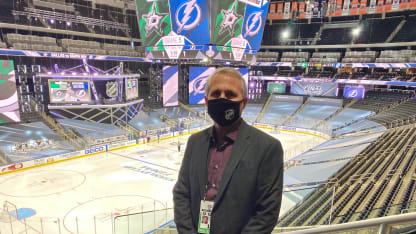NHL joins five other leagues in COVID-19 study
MLB, MLS, NBA, NFL, WNBA examine cardiac effects of virus

Five athletes infected with COVID-19 had evidence of inflammatory heart disease out of 789 studied by MLB, MLS, NBA, NFL, NHL and WNBA, a rate of 0.6 percent. No adverse cardiac events occurred in the athletes who underwent cardiac screening and returned to play.
"I think that should be reassuring to the public," said NHL Chief Medical Officer Winne Meeuwisse, one of 16 authors of the study published Thursday by JAMA Cardiology, a monthly peer-reviewed journal established by the American Medical Association.
Pro sports leagues had little data on COVID-19 when the pandemic struck about a year ago. The NHL paused the 2019-20 season March 12, 2020.
A concern was the effect COVID-19 might have on the heart. Among the general population, researchers have seen a high prevalence of cardiac injury in patients hospitalized with the disease, according to the study in JAMA Cardiology.
"We decided, 'Let's pool our data together and come up with a large enough population of people to say something more conclusive or something more meaningful," Meeuwisse said.
In the past, Meeuwisse would speak to the chief medical officers of the other pro sports leagues a couple of times a year. During the pandemic, they have spoken weekly.
"It's a new thing, and so we're all figuring it out on the fly," Meeuwisse said. "This is one example of where we can learn from each other, because we have some experiences in common and we have some experiences that are different, and by communicating that, we can improve how we care for athletes across all sports.
"By doing this study and specifically publishing it, the hope is that this provides useful information to the broader medical and sports community in terms of doing screening or not and what you can expect to find."
Each athlete who tested positive for COVID-19 across the six pro sports leagues underwent three heart tests. If the result of one of the heart tests was abnormal, the athlete underwent further testing.
Out of the 789 athletes studied, 30 had an abnormal heart test result. Out of those 30, five had further testing that suggested inflammatory heart disease, resulting in restriction from play.
Two Columbia University cardiologists collected and analyzed the data, which did not identify the athletes. The other authors reviewed and revised the paper. Then it went to the six pro sports leagues and their respective players' associations for approval.
"For that to occur as quickly as it did is remarkable, and I think it's a great service to the medical community to have this data out there in such a timely fashion in the middle of this pandemic," Meeuwisse said.
The study reviewed cardiac testing between May and October. The NHL had 68 players test positive for COVID-19 in that period, all before the NHL staged the 2020 postseason without any positive tests in bubbles in Edmonton and Toronto from Aug. 1-Sept. 28. Of those 68, one had an abnormal heart test result.
"One of the issues with the study is that there is some subjectivity and variability in how you interpret these tests," Meeuwisse said. "One player we had looked abnormal initially. With further screening and testing, it was determined that it was not abnormal. He did not have inflammatory heart problems."
Meeuwisse declined to say how many NHL players have tested positive for COVID-19 since October. The NHL is releasing the names of players who are unavailable to play under the COVID-19 protocols but not whether they have tested positive. They can be unavailable for a variety of reasons, such as close contact with someone who has been infected.
Meeuwisse said the six pro sports leagues have continued the same cardiac screening process, though they may consider not screening asymptomatic players in the future, because all the players with abnormal heart test results were symptomatic.
"We're in the middle of a season," Meeuwisse said. "We're not going to change midstream at this point. But it's something that I think we'll reevaluate when the season's over."
What does this mean for the general public?
These are professional athletes. But they are stressing their hearts to the max, and because each one who tested positive for COVID-19 received a cardiac screening, no problem should have gone undetected. That makes the 0.6 percent figure significant, Meeuwisse said.
"The weakness is that it's a select group of people -- by nature, the fact that they're the most elite," Meeuwisse said. "But on the other hand, they're also the group that's putting the most load on their heart. This study should provide some reassurance to people at all levels of sport."

















